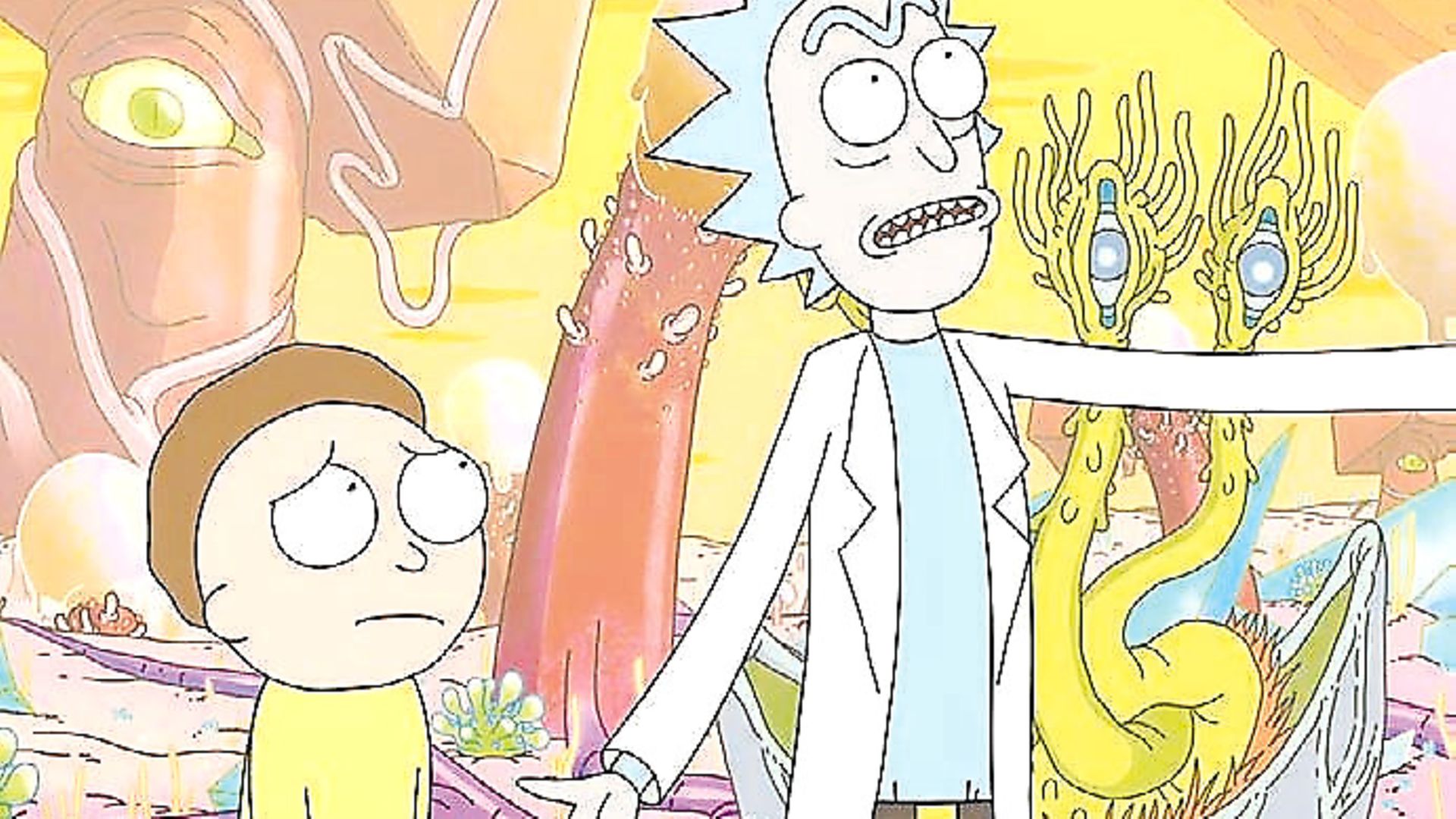
WILL SELF on the cultural significance of Rick and Morty
Rick and Morty is an American cartoon comedy show that has its origins in a spoof of Back to the Future. The eponymous characters are an inventor grandfather and his sidekick grandson, who, using a ‘portal gun’ travel through multiple universes engaging in adventures at once fantastical, surreal and often very scatological. I’m not altogether sure why I’m offering this synopsis, because I’m pretty sure if you drew a Venn diagram of the show’s audience and this column’s readership, the overlap would be considerable.
One of the many themes underpinning Rick and Morty is that of the interplay between the multiplication of media, and the commodification of culture: the duo’s ability to transcend space and time means that not only do they encounter a myriad of alien societies, but if they get bored or fed up with any of them, they can simply quit that reality and enter a new one. Indeed, such is their consumptive profligacy, if they ‘use up’ one universe (even one including versions of themselves and their family), they are quite happy to destroy it, in toto, much as we would chuck aside a book we’re not enjoying, or change television channels. Indeed, in the series, Rick and Morty are themselves cultural omnivores, lounging in front of something Rick has invented called ‘intergalactic TV’, which features an infinite series of programmes – so: everything it’s possible for us to imagine (say, Jeremy Clarkson interviewing famous philosophers who have been raised from the dead), and a lot more.
The multiverse underpinning the fictional realm of Rick and Morty can be interpreted various ways: as a celebration of the immense richness and variety of human experience – or as satiric trope that exposes our wastefulness and profligacy. After all, far from being able to directly access an infinite number of worlds we’re steadily rendering uninhabitable the only one we have. Alternatively, we can read the trope in purely cultural terms: Rick and Morty are the ultimate channel surfers, whose gnat-like attention spans mirror our own. In episode eight of the latest season of the show, Rick, at Morty’s behest, invents a remote controller for reality itself, that allows his grandson to enter into a situation – and then, if it doesn’t pan out as he’d like, flick a button and rewind to the point where his act of will forked the path. Needless to say, all sort of dreadful consequences spool out from factoring these god-like powers into a handheld device wielded by a 13-year-old, and, at the end of the episode, the duo once again are compelled to discard an entire universe as if it were a free newspaper being crumpled up and chucked in a bin.
You don’t have to be a cynic to note that many contemporary cultural productions are effectively advertising mediums predicated on their circulation, or their audience numbers: the relentless pullulating of effectively free music, film, text and talking heads via the web is our version of intergalactic TV, and so long as we wield our portal guns/controllers effectively, we can effortlessly skip from one to the next – our liberty is only dependent on our willingness to be passive shills. Moreover, given the nature of digital media, we can also skip about within any given film, programme, lecture or piece of music – effectively replacing chronological progression with our own godlike perspective sub specie aeternitatis.
Gone are the days when we had to sit though anything – and now we no longer even leave our homes, there’s no need for the embarrassment of hunching our way along the row, conscious of eyes-on-our-crotch as we evacuate from this dull play, or that inexorably boring film. Some might think such cherry-picking ignores the reality; which is that any serious cultural artefact – and I’d include TV shows such as Rock and Morty in this – is a fruit salad, one in which the kiwis need to be tasted alongside the raspberries for the whole melange to work. Certainly, as a novelist, I’d expect my readers to be able to put up with a fair amount of seemingly irrelevant stuff in order to descry the overall significance of the work – but there’s a universe of difference between the cognitive heavy-lifting involved in reading serious fiction, and the supine state within which we flick from this monster truck rally to that rallying of monsters in trucks.
Besides, if you really love a novel you’ll happily reread it – knowing fine well that Anna Karenina will still commit suicide, or that it was Smerdyakov who killed Fyodor Pavlovich. For the truly cultured, amor fati is the motto: whereas for the mere cultural consumers it’s fast forward, rewind and delete. Of course, just as with readers of this column and viewers of Rick and Morty, there’s a considerable overlap between the two categories – one that all of us contain within our increasingly febrile and aching heads.
Warning: Illegal string offset 'link_id' in /mnt/storage/stage/www/wp-includes/bookmark.php on line 357
Notice: Trying to get property 'link_id' of non-object in /mnt/storage/stage/www/wp-includes/bookmark.php on line 37







